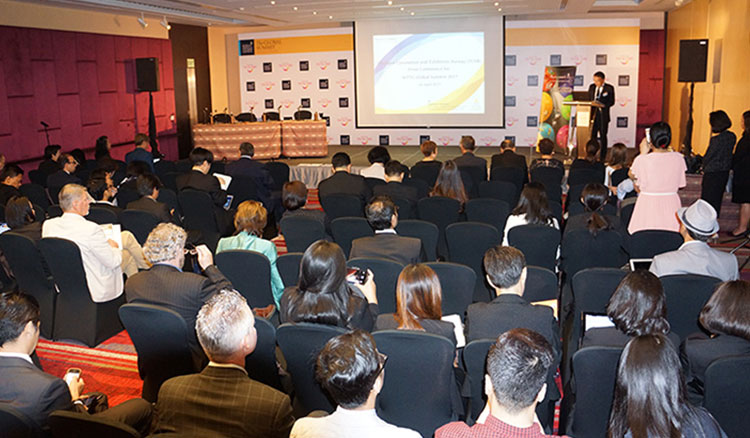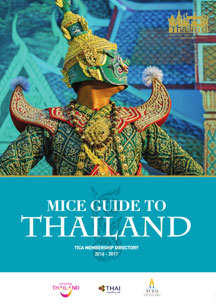
TCEB
THAILAND’S SMART MICE A SUCCESS STORY
BANGKOK 26 April 2017: Thailand Convention and Exhibitions Bureau, or TCEB, announced a strategy to position Thailand as a top MICE destination in Asia,
during the World Travel and Tourism Council Global Summit today, and a trade powerhouse for many industrial groups. Thailand’s strategic location makes it an
ideal business gateway to innovative solutions, related business organizations, government agencies, global network collaborations for extra business benefits.
Thailand is hosting the by-invitation-only WTTC Global Summit in Bangkok, this week, an event that attracts 500 travel industry leaders and top representatives of
more than 50 governments.
The country’s Meetings, Incentives, Conventions and Exhibitions (MICE) business has been identified as an economic driver and part of a prominent services industry
cluster. As such it will play a vital role in the government’s strategy to steer the national economy to a Thailand Version 4.0 era.

“When the government announced its policy to embrace Thailand 4.0, the MICE industry has responded positively driven by innovation and technology,” said TCEB Vice
President Supawan Teerarat. “TCEB has prepared an integrated plan for MICE that will stimulate the economy in line with the national strategy spanning 20 years, 2016 to
2036, with the doable objective of creating economic wealth and spreading prosperity so all sectors can grow steadily.”
Thailand’s business events belongs to a cluster of high-value creative culture services identified as one of five sectors prioritised in the ambitious Thailand 4.0 plan.
The other four industries identified in the drive to gear up the economy are: Food Agriculture & Bio-Tech; Health Wellness & Bio Medicine; Smart Devices, Robotics Mechatronic;
Digital IOT and Convergence.
Illustrating the economic power of Thailand’s growing business events, an economic impact study in 2015, revealed the MICE industry generated expenditure in the country's
economic system of 222.7 billion baht (USD6,300 million).
TCEB plays a major role in pushing high value events to Thailand through its campaigns and a raft of incentives for both event organisers and international delegates.
A government agency working under the supervision of the Prime Minister’s Office, it has a mission to create long–term competitiveness and sustainable fundamentals for MICE
industry in Thailand.
“Our ultimate goal is to make the Thai MICE industry able to compete effectively in the international arena and play a vital role in country’s economy and industrial development,”
said the TCEB Vice president.
“This is achieved by ensuring business events hosted in Thailand generate economic impacts and provide sustainable growth for the venue city, while delivering valuable travel
experiences for delegates.”
The long-term plan seeks to enhance Thailand’s service quality and promote the country as a regional centre for investment and services, especially in the events sector.
Tagged Smart MICE in the run-up to Thailand 4.0, TCEB will leverage technology to support growth in the events industry, promote new start-ups, focus on high value services
and build knowledge skilled workers. Core features of the TCEB’s Smart MICE initiative leverage the strengths of technology, creativity and innovation.

A key player that draws support from the private sector to initiate Smart MICE projects, the Thailand Incentive and Convention Association musters 409 private sector members
in the MICE/Business Events supplier industry.
Commenting on its role, TICA president, Sumate Sudasna said: “Our mission has been to promote Thailand as a preferred destination for MICE/business event when the Thailand
Convention and Exhibition Bureau (TCEB) was founded in 2004, support from the government for MICE events was shifted from TAT to TCEB and that has led to TICA continuously
collaborating closely with TCEB with the mutual objectives of marketing and developing the industry.”
The Thai Exhibition Association or commonly known as the TEA has played a strategic role attracting more exhibitions, which is a core element outlined in Thailand 4.0 objectives.
“A dynamic exhibition industry, creates a hub for business, and links between the private sectors and the government, therefore, we work closely with TCEB to move the nation
forward to a new chapter in the exhibition industry, ” said TEA president, Talun Theng.

Thailand’s MICE industry has an impressive track record. It generates 164,427 jobs, while benefitting industry networking and generating tax revenue of 10,400 million Baht
according to a 2015 Frost and Sullivan study.
The MICE industry contributed 0.84% of Thailand GDP in 2015. The industry’s GDP contribution in 2015 was registered at 113.5 billion Baht.
Adding value, Thailand’s MICE industry contributes networking opportunities, brand building and offering opportunities for cross-industry skill sharing.
A MICE traveller contributes 3.5 times more to Thailand’s economy than the typical leisure traveller in terms of spending per day.
On average, the typical MICE traveller spends an estimated 16,095.19 Baht per day. A leisure traveller spends 4,616.49 baht per day.
Despite leisure travellers spending more time in Thailand (9.85 days), MICE travellers, at an average 5.28 days, spend more per trip.
Over the last decade, 2006 to 2016, Thailand welcomed 9,483,820 international MICE travellers who generated a direct spend of 782,594 million baht in direct spend.
By 2036, Thailand will welcome around 3 million international MICE travellers annually, earning 557,000 million Baht in revenue.




